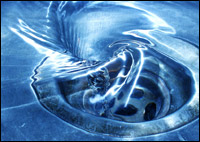Dear Umbra,
Twenty years ago, I lived off the grid and learned how to conserve water. That lesson stayed with me, and it’s agonizing for me to witness the cavalier, wasteful treatment of precious freshwater. My elderly mother moved in with me two years ago, and all is lovely and fine, except that she wastes more water with basic household activities than any single individual I’ve ever seen.
Do you have any suggestions on household water conservation? While many water-saving methods are obvious to me, they have escaped my mother’s attention, despite my not-so-subtle hints and suggestions. Thanks for any help you can offer.
Drowning in Idaho,
Lexie
Sagle, Idaho
Dearest Lexie,
Sounds like you need a household that is self-conserving, rather than requiring conservation from the user. Let’s say, for example, that mom’s running the faucet full blast while brushing her teeth. You might not be able to get her to stop, but you can reduce water flow through the faucet.

Water down the drain.
Reducing her (and your) water use will require an initial cash outlay, but this will eventually be recouped in water and energy savings. I will propose a shopping list for what I imagine are her high-flow areas.
First are the simple items. Buy aerators for all of your sink faucets. These are simply mesh faucet ends that slow the gallons-per-minute water usage. (They are easy to attach — you just screw them on — but they may need occasional rinsing when clogged.) Next, get a low-flow showerhead, easily installable by even a tepidly intrepid person. You can do all of this for less than $20 plus certified water savings (the amount will vary depending on model) with no loss of lifestyle quality.
Dishwashing may be another area of significant water waste. An efficient dishwasher is better than most hand-washing techniques. If you have an older machine and need to pre-rinse rather than just scrape all the dishes, buy a new one and assign a rubber spatula to the sink. As for dishes that must be hand-washed: Put a dish tub in the sink so that your mother will see it fill up as she runs the water. She just might be encouraged to turn off the tap and use the caught water.
Also, replace your washing machine if it is not a newer, energy-efficient model. Again, the initial cash outlay may seem daunting, but the ACEEE’s Consumer Guide to Home Energy Savings estimates that a new washer may save you up to $100 a year. You can pick up a copy of the guide at your library when you’re ready to shop for specific appliances.
The other large area of water use in most homes is the landscape. As you characterize your mother as “elderly,” I doubt she is responsible for the bulk of the gardening, but you could cut down on household water use with some simple changes, such as watering only in early morning hours, or installing irrigation if you are currently watering plants from overhead instead. Both of these steps reduce evaporative water loss. Ripping out a grass lawn and landscaping with native plants are two additional, water-saving steps to consider over time.
Another option — and one that can both reduce your wasted household water and take care of your lawn — is to install a gray-water system on the house drains. Gray-water systems consist of a series of pipes that guide used water away from the sewer, through a filtration system, and into the yard. You’ve already lived off the grid, so perhaps you are familiar with this idea. I’ll look into simple gray-water system designs and report back.
Pipingly,
Umbra

